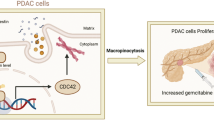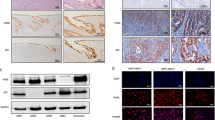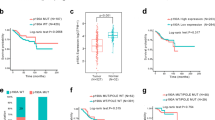Abstract
Rates of the most common gynecologic cancer, endometrioid adenocarcinoma (EAC), continue to rise, mirroring the global epidemic of obesity, a well-known EAC risk factor. Thus, identifying novel molecular targets to prevent and/or mitigate EAC is imperative. The prevalent Type 1 EAC commonly harbors loss of the tumor suppressor, Pten, leading to AKT activation. The major endoplasmic reticulum (ER) chaperone, GRP78, is a potent pro-survival protein to maintain ER homeostasis, and as a cell surface protein, is known to regulate the phosphatidylinositol 3-kinase (PI3K)/AKT pathway. To determine whether targeting GRP78 could suppress EAC development, we created a conditional knockout mouse model using progesterone receptor-Cre-recombinase to achieve Pten and Grp78 (cPtenf/fGrp78f/f) deletion in the endometrial epithelium. Mice with a single Pten (cPtenf/f) deletion developed well-differentiated EAC by 4 weeks. In contrast, no cPtenf/fGrp78f/f mice developed EAC, even after more than 8 months of observation. Histologic examination of uteri from cPtenf/fGrp78f/f mice also revealed no complex atypical hyperplasia, a well-established EAC precursor. These histologic observations among the cPtenf/fGrp78f/f murine uteri also corresponded to abrogation of AKT activation within the endometrium. We further observed that GRP78 co-localized with activated AKT on the surface of EAC, thus providing an opportunity for therapeutic targeting. Consistent with previous findings that cell surface GRP78 is an upstream regulator of PI3K/AKT signaling, we show here that in vivo short-term systemic treatment with a highly specific monoclonal antibody against GRP78 suppressed AKT activation and increased apoptosis in the cPtenf/f tumors. Collectively, these findings present GRP78-targeting therapy as an efficacious therapeutic option for EAC.
This is a preview of subscription content, access via your institution
Access options
Subscribe to this journal
Receive 50 print issues and online access
$259.00 per year
only $5.18 per issue
Buy this article
- Purchase on Springer Link
- Instant access to full article PDF
Prices may be subject to local taxes which are calculated during checkout







Similar content being viewed by others

References
Siegel R, Ma J, Zou Z, Jemal A . Cancer statistics 2014 CA Cancer J Clin 2014; 64: 9–29.
Kandoth C, Schultz N, Cherniack AD, Akbani R, Liu Y, Shen H et al. Integrated genomic characterization of endometrial carcinoma. Nature 2013; 497: 67–73.
Iglesias DA, Bodurka DC . Personalized care in uterine cancer. Clin Adv Hematol Oncol 2012; 10: 797–805.
Leslie KK, Thiel KW, Goodheart MJ, De Geest K, Jia Y, Yang S . Endometrial cancer. Obstet Gynecol Clin North Am 2012; 39: 255–268.
Daikoku T, Hirota Y, Tranguch S, Joshi AR, DeMayo FJ, Lydon JP et al. Conditional loss of uterine Pten unfailingly and rapidly induces endometrial cancer in mice. Cancer Res 2008; 68: 5619–5627.
Fu Y, Wey S, Wang M, Ye R, Liao CP, Roy-Burman P et al. Pten null prostate tumorigenesis and AKT activation are blocked by targeted knockout of ER chaperone GRP78/BiP in prostate epithelium. Proc Natl Acad Sci USA 2008; 105: 19444–19449.
Wey S, Luo B, Tseng CC, Ni M, Zhou H, Fu Y et al. Inducible knockout of GRP78/BiP in the hematopoietic system suppresses Pten-null leukemogenesis and AKT oncogenic signaling. Blood 2012; 119: 817–825.
Conley-LaComb MK, Saliganan A, Kandagatla P, Chen YQ, Cher ML, Chinni SR . PTEN loss mediated Akt activation promotes prostate tumor growth and metastasis via CXCL12/CXCR4 signaling. Mol Cancer 2013; 12: 85.
Cordero-Espinoza L, Hagen T . Increased concentrations of fructose 2,6-bisphosphate contribute to the Warburg effect in phosphatase and tensin homolog (PTEN)-deficient cells. J Biol Chem 2013; 288: 36020–36028.
Di Cristofano A, Pesce B, Cordon-Cardo C, Pandolfi PP . Pten is essential for embryonic development and tumour suppression. Nat Genet 1998; 19: 348–355.
He L, Hou X, Kanel G, Zeng N, Galicia V, Wang Y et al. The critical role of AKT2 in hepatic steatosis induced by PTEN loss. Am J Pathol 2010; 176: 2302–2308.
Chen WT, Tseng CC, Pfaffenbach K, Kanel G, Luo B, Stiles BL et al. Liver-specific knockout of GRP94 in mice disrupts cell adhesion, activates liver progenitor cells, and accelerates liver tumorigenesis. Hepatology 2014; 59: 947–957.
Ni M, Lee AS . ER chaperones in mammalian development and human diseases. FEBS Lett 2007; 581: 3641–3651.
Lee AS . Glucose-regulated proteins in cancer: molecular mechanisms and therapeutic potential. Nat Rev Cancer 2014; 14: 263–276.
Luo B, Lee AS . The critical roles of endoplasmic reticulum chaperones and unfolded protein response in tumorigenesis and anticancer therapies. Oncogene 2013; 32: 805–818.
Mahadevan NR, Rodvold J, Sepulveda H, Rossi S, Drew AF, Zanetti M . Transmission of endoplasmic reticulum stress and pro-inflammation from tumor cells to myeloid cells. Proc Natl Acad Sci USA 2011; 108: 6561–6566.
Bifulco G, Miele C, Di Jeso B, Beguinot F, Nappi C, Di Carlo C et al. Endoplasmic reticulum stress is activated in endometrial adenocarcinoma. Gynecol Oncol 2012; 125: 220–225.
Lee E, Nichols P, Spicer D, Groshen S, Yu MC, Lee AS . GRP78 as a novel predictor of responsiveness to chemotherapy in breast cancer. Cancer Res 2006; 66: 7849–7853.
Gray MJ, Mhawech-Fauceglia P, Yoo E, Yang W, Wu E, Lee AS et al. AKT inhibition mitigates GRP78 (glucose-regulated protein) expression and contribution to chemoresistance in endometrial cancers. Int J Cancer 2013; 133: 21–30.
Schmandt RE, Iglesias DA, Co NN, Lu KH . Understanding obesity and endometrial cancer risk: opportunities for prevention. Am J Obstet Gynecol 2011; 205: 518–525.
Hotamisligil GS . Endoplasmic reticulum stress and the inflammatory basis of metabolic disease. Cell 2010; 140: 900–917.
Matsuo K, Gray MJ, Yang DY, Srivastava SA, Tripathi PB, Sonoda LA et al. The endoplasmic reticulum stress marker, glucose-regulated protein-78 (GRP78) in visceral adipocytes predicts endometrial cancer progression and patient survival. Gynecol Oncol 2013; 128: 552–559.
Ma Y, Hendershot LM . The role of the unfolded protein response in tumour development: friend or foe? Nat Rev Cancer 2004; 4: 966–977.
Wu J, Kaufman RJ . From acute ER stress to physiological roles of the unfolded protein response. Cell Death Differ 2006; 13: 374–384.
Ron D, Walter P . Signal integration in the endoplasmic reticulum unfolded protein response. Nat Rev Mol Cell Biol 2007; 8: 519–529.
Ni M, Zhang Y, Lee AS . Beyond the endoplasmic reticulum: atypical GRP78 in cell viability, signalling and therapeutic targeting. Biochem J 2011; 434: 181–188.
Zhang Y, Liu R, Ni M, Gill P, Lee AS . Cell surface relocalization of the endoplasmic reticulum chaperone and unfolded protein response regulator GRP78/BiP. J Biol Chem 2010; 285: 15065–15075.
Zhang Y, Tseng CC, Tsai YL, Fu X, Schiff R, Lee A . Cancer cells resistant to therapy promote cell surface relocalization of GRP78 which complexes with PI3K and enhances PI(3,4,5)P3 production. PLoS One 2013; 8: e80071.
Gonzalez-Gronow M, Selim MA, Papalas J, Pizzo SV . GRP78: a multifunctional receptor on the cell surface. Antioxid Redox Signal 2009; 11: 2299–2306.
Sato M, Yao VJ, Arap W, Pasqualini R . GRP78 signaling hub a receptor for targeted tumor therapy. Adv Genet 2010; 69: 97–114.
Arap MA, Lahdenranta J, Mintz PJ, Hajitou A, Sarkis AS, Arap W et al. Cell surface expression of the stress response chaperone GRP78 enables tumor targeting by circulating ligands. Cancer Cell 2004; 6: 275–284.
Liu R, Li X, Gao W, Zhou Y, Wey S, Mitra SK et al. Monoclonal antibody against cell surface GRP78 as a novel agent in suppressing PI3K/AKT signaling, tumor growth and metastasis. Clin Cancer Res 2013; 19: 6802–6811.
Wey S, Luo B, Lee AS . Acute inducible ablation of GRP78 reveals its role in hematopoietic stem cell survival, lymphogenesis and regulation of stress signaling. PLoS One 2012; 7: e39047.
Cali G, Insabato L, Conza D, Bifulco G, Parrillo L, Mirra P et al. GRP78 mediates cell growth and invasiveness in endometrial cancer. J Cell Physiol 2014; 229: 1417–1426.
Pootrakul L, Datar RH, Shi SR, Cai J, Hawes D, Groshen SG et al. Expression of stress response protein Grp78 is associated with the development of castration-resistant prostate cancer. Clin Cancer Res 2006; 12: 5987–5993.
Li J, Lee AS . Stress induction of GRP78/BiP and its role in cancer. Curr Mol Med 2006; 6: 45–54.
Lee E, Nichols P, Groshen S, Spicer D, Lee AS . GRP78 as potential predictor for breast cancer response to adjuvant taxane therapy. Int J Cancer 2011; 128: 726–731.
Zhuang L, Scolyer RA, Lee CS, McCarthy SW, Cooper WA, Zhang XD et al. Expression of glucose-regulated stress protein GRP78 is related to progression of melanoma. Histopathology 2009; 54: 462–470.
Zhang LH, Yang XL, Zhang X, Cheng JX, Zhang W . Association of elevated GRP78 expression with increased astrocytoma malignancy via Akt and ERK pathways. Brain Res 2011; 1371: 23–31.
Misra UK, Deedwania R, Pizzo SV . Activation and cross-talk between Akt, NF-{kappa}B, and unfolded protein response signaling in 1-LN prostate cancer cells consequent to ligation of cell surface-associated GRP78. J Biol Chem 2006; 281: 13694–13707.
Shin BK, Wang H, Yim AM, Le Naour F, Brichory F, Jang JH et al. Global profiling of the cell surface proteome of cancer cells uncovers an abundance of proteins with chaperone function. J Biol Chem 2003; 278: 7607–7616.
Hill R, Li Y, Tran LM, Dry S, Calvopina JH, Garcia A et al. Cell intrinsic role of COX-2 in pancreatic cancer development. Mol Cancer Ther 2012; 11: 2127–2137.
Bokhman JV, Chepick OF, Volkova AT, Vishnevsky AS . Can primary endometrial carcinoma stage I be cured without surgery and radiation therapy? Gynecol Oncol 1985; 20: 139–155.
Liu R, Ferguson BD, Zhou Y, Naga K, Salgia R, Gill PS et al. EphB4 as a therapeutic target in mesothelioma. BMC Cancer 2013; 13: 269.
Acknowledgements
We thank the USC Norris Comprehensive Cancer Center Translational Pathology Core for tissue processing and the USC Research Center for Liver Diseases Cell and Tissue Imaging Core. We also thank the members of the Lee lab, particularly Wan-Ting Chen, Genyuan Zhu and Michelle Pong for their input and assistance throughout this project. This work was supported by the USC Department of Obstetrics & Gynecology Seed Grant (YGL), Stop Cancer Career Development Award (YGL), NIH Grant R01 CA027607 (ASL), NIH Grant K08 CA175161 (YGL) and NCI Cancer Center Support Grant (P30 CA014089, ASL/YGL). Microscopy at the Cell and Tissue Imaging Core of the USC Research Center for Liver Diseases was supported by NIH Grant P30 DK048522.
Author information
Authors and Affiliations
Corresponding authors
Ethics declarations
Competing interests
The authors declare no conflict of interest.
Additional information
Supplementary Information accompanies this paper on the Oncogene website
Supplementary information
Rights and permissions
About this article
Cite this article
Lin, Y., Shen, J., Yoo, E. et al. Targeting the glucose-regulated protein-78 abrogates Pten-null driven AKT activation and endometrioid tumorigenesis. Oncogene 34, 5418–5426 (2015). https://doi.org/10.1038/onc.2015.4
Received:
Revised:
Accepted:
Published:
Issue Date:
DOI: https://doi.org/10.1038/onc.2015.4
This article is cited by
-
Cell surface GRP78: a potential mechanism of therapeutic resistant tumors
Cancer Cell International (2023)
-
Autophagy, molecular chaperones, and unfolded protein response as promoters of tumor recurrence
Cancer and Metastasis Reviews (2023)
-
Transketolase promotes colorectal cancer metastasis through regulating AKT phosphorylation
Cell Death & Disease (2022)
-
A radiogenomics application for prognostic profiling of endometrial cancer
Communications Biology (2021)
-
Clinicopathological significance of endoplasmic reticulum stress proteins in ovarian carcinoma
Scientific Reports (2020)


